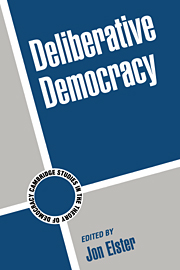Book contents
- Frontmatter
- Contents
- List of Contributors
- Preface and Acknowledgment
- Introduction
- 1 “Claro!”: An Essay on Discursive Machismo
- 2 Deliberation as Discussion
- 3 All Men Are Liars: Is Democracy Meaningless?
- 4 Deliberation and Constitution Making
- 5 Pathologies of Deliberation
- 6 Deliberation and Ideological Domination
- 7 Arguing for Deliberation: Some Skeptical Considerations
- 8 Democracy and Liberty
- 9 Health-Health Trade-offs
- 10 Full Representation, Deliberation, and Impartiality
- Index
5 - Pathologies of Deliberation
Published online by Cambridge University Press: 05 June 2012
- Frontmatter
- Contents
- List of Contributors
- Preface and Acknowledgment
- Introduction
- 1 “Claro!”: An Essay on Discursive Machismo
- 2 Deliberation as Discussion
- 3 All Men Are Liars: Is Democracy Meaningless?
- 4 Deliberation and Constitution Making
- 5 Pathologies of Deliberation
- 6 Deliberation and Ideological Domination
- 7 Arguing for Deliberation: Some Skeptical Considerations
- 8 Democracy and Liberty
- 9 Health-Health Trade-offs
- 10 Full Representation, Deliberation, and Impartiality
- Index
Summary
The dominant view among contemporary political theorists, including some theorists writing in this volume, is that deliberation improves the quality of decisions and enriches democracy. In this essay I turn a more skeptical eye on deliberation and its effects. I do so not as an advocate of closed, authoritarian collective decision making. Instead, my intention is to identify scenarios in which deliberation produces outcomes that are perverse from the perspective of democratic theory. These pathologies of deliberation, like their physiological counterparts, must be understood if we are to immunize ourselves against them.
I accept Przeworski's broad definition of deliberation, offered in Chapter 6, this volume, as the endogenous change of preferences resulting from communication. I am particularly interested in the influence of public communication on the preferences and identities of citizens in democratic settings, and the influence of citizens' preferences on government policy.
Information produced as societies collectively consider how to organize themselves influences what people believe is best for them and for others. These beliefs in turn often depend on the causal models we have in our minds about the effect of a given course of action on our well-being and that of others. Public communication influencing these causal beliefs is as important as deliberation over normative matters, and perhaps more subject to manipulation. It may be hard for me to convince you of the normative correctness of spending money on public education if you are dedicated to an extreme version of laissez-faire, just as it is hard to convince someone to invert his or her preference for chocolate versus strawberry ice cream.
- Type
- Chapter
- Information
- Deliberative Democracy , pp. 123 - 139Publisher: Cambridge University PressPrint publication year: 1998
- 84
- Cited by

